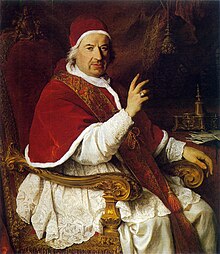Vix pervenit (encyclical)
Vix pervenit is the title of an encyclical published by Pope Benedict XIV on November 1st, 1745 in Rome . The addressees of the encyclical were the patriarchs , archbishops , bishops and religious orders of Italy . The title mentions the first two words of the circular written in Latin. Vix pervenit means loosely translated: Hardly came to our ears .
Go to content
The encyclical deals with the question of whether a Christian is allowed to take interest ( usura ) on a loan . The answer is a no to usury , the excessive interest: The sin, which is called usura and has its actual seat and origin in the loan agreement, is based on the fact that someone demands more from the loan than the other has received from him [ ...] Any profit that exceeds the loaned amount is therefore illegal and usurious . It goes on to say: But one paid homage ... to a wrong and very daring view, if one were to think ... that it is always permissible to take a legitimate surplus value over and above the full and undisputed master sum, whenever one has money, grain or something else of this kind credited to another. So when one thinks, he is not only at odds with divine teachings and the Church's decision on loan interest, but undoubtedly also with the general human consciousness and with natural reason .
In the implementing regulations for the Italian Church it is expressly required that nothing deviating from the above theses may be presented at any synod, sermon or Christian teaching. Those who disobey this demand have to reckon with the penalties that St. Canons are imposed on those who despise and transgress the apostolic directives . Church leaders are also instructed to brand the stigma and vice of loan interest with reference to the Holy Scriptures.
To the prehistory
Up until the beginning of the 18th century - in contrast to Protestantism, for example, which was influenced by Calvinists - the biblical prohibition of interest was doctrinally undisputed in the Roman Catholic Church . In practice, however, this verdict has been circumvented through a series of special loan agreements. In 1740, Petrus Ballerini , rector of the Verona Academy , published a treatise in which he warned against the error that the prohibition of interest only concerned so-called usury . Both the Old and New Testaments as well as the Church Fathers , councils and popes would have unanimously described any loan interest as usury. This writing became particularly explosive because the city of Verona had imposed a public loan on its citizens at almost the same time , which was supposed to bear four percent interest. There were similar ordinances in other Italian cities. These connections led to a passionate nationwide interest rate discussion.
The poet , archaeologist and polymath Francesco Scipio Maffei intervened in this dispute by publishing three books dedicated to Maffei's friend and former teacher, Pope Benedict XIV. The title of the book series was: Dell 'impiego del denaro, libri tre (German: About the investment of money, three books ). In the first volume Maffei tried to prove that the Holy Scriptures do not prohibit a legally regulated and moderate interest at any point. The positions of the church fathers, canon law and the doctrine of the church are the focus of the second book of Maffei. Here - according to the author - there is agreement that usury is sinful in character, but not moderate interest rates of four to five percent. In the third volume reasons of reason are given which - according to Maffei et al. a. - refute the theory of the sterility of money .
Since Maffei's books on investing money aggravated the dispute, Benedict XIV, to whom these writings were dedicated, was forced to react. The introductory sentences and thus the title of the encyclical Vix pervenit tie in with this dispute: On the occasion of the dispute that broke out (it revolves around whether a certain contract should be considered legally binding), we heard that opinions were spreading about Italy that seem inconsistent with sound teaching. So that such an evil would not become even stronger through prolonged silence, We immediately considered it to be our duty to our apostolic office to offer an effective antidote and to deprive the evil of the possibility of growing further and of infecting cities in Italy that were still intact .
literature
- Viktor Pfluger (Hg): About usury and other profits. Apostolic circular on November 1, 1745 from Pope Benedict XIV (with an explanation by Viktor Pfluger: Is the Church's doctrine of interest still valid? ), 2nd edition, Müstair / Switzerland, 1999 ISBN 3-909065-13-9
Web links
- German translation of the encyclical Vix pervenit
- Andreas Michael Weiß: Interest and Usury. The church's ban on interest and the obstacles on the way to its correction (PDF file; 121 kB)
Individual evidence
- ^ A German translation of the encyclical Vix pervenit can be found on a user page of the Free University of Berlin ; accessed on November 11, 2008
- ^ Vix pervenit , §3, section I.
- ^ Vix pervenit , §3, section V
- ^ Vix pervenit , §5
- ^ Vix pervenit , §7
- ↑ Petrus Ballerini: Summa theologica sancti Augustini , preface to vol. I, Verona 1740
- ^ H. Röhrig: Prehistory of the encyclical Vix pervenit ; Accessed November 12, 2008
- ^ Translation of the Latin text of the Vix pervenit ; accessed on November 13, 2008

